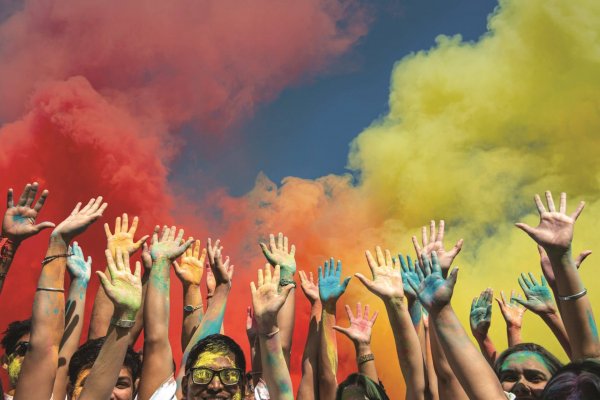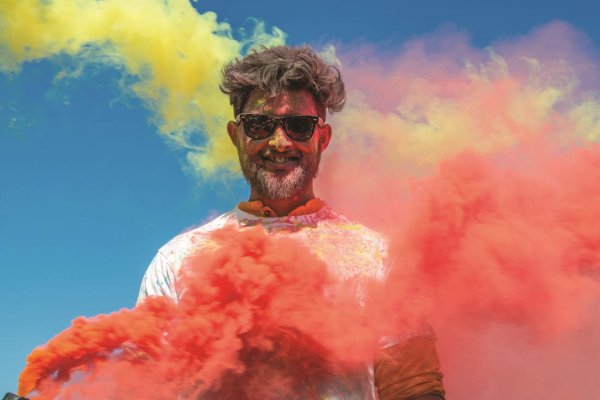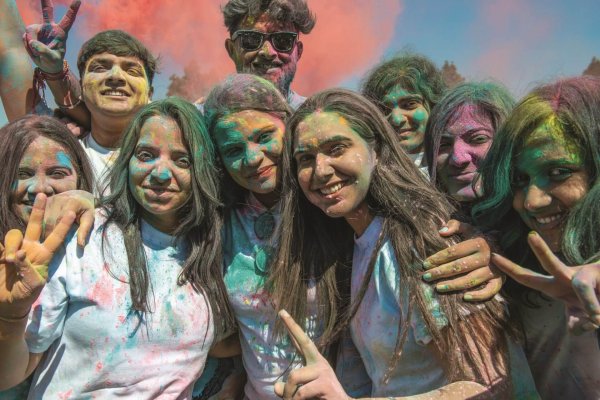A Touch of India
When Bharathwaj “Bat” Nandakumar arrived at USC in July 2006 to begin his graduate studies in computer science, he needed a place to stay before the school year began.
Nandakumar, M.S. CS ’07, did what scores of Indian students have done before and since: He turned to the Association of Indian Students (AIS) for help.
Founded in 1994 to provide a way for students from India to connect through social events, holiday celebrations and meetings, AIS came through for Nandakumar in a big way. AIS graduate students let Nandakumar, along with 10 other new USC students from India, stay in their apartments for three weeks. They fed Nandakumar and their guests homemade Indian food like rice, dal and rajma, helped them open bank accounts and even let them call their parents back home free of charge.

“AIS acted as an extended family and gave me an amazing sense of community that helped me at USC,” said Nandakumar, now an AIS mentor and a specialist engineer for “Call of Duty: Black Ops” series 1–4, among the most popular video games of all time. “Whether watching a Bollywood movie, the Cricket World Cup or celebrating an Indian holiday, AIS makes members feel closer to home.”
AIS, which is celebrating its 25th anniversary, and its predecessor, the Indian Student Association, have given the university’s Indian students — the majority of whom study engineering — a home away from home. At the same time, USC Viterbi itself has played an outsized role in helping many of them thrive through its recruiting and retention efforts and alumni networks.
The Indian students, in addition to their many academic contributions, have “added to the rich tapestry of the overall university experience,” said Varun Soni, AIS faculty adviser and USC’s dean of religious life.
As India’s economy and the number of Indian students at USC has grown, so, too has the engineering school’s commitment to these talented, ambitious young men and women. In the early 2000s, USC Viterbi professors and leaders began visiting India to educate prospective engineering students about the school. In 2011, it became the first American engineering school to have an office in India.
“The Indian graduate students at USC Viterbi have many wonderful attributes, outstanding scholarly talent, and innovative and entrepreneurial mindsets,” said USC Viterbi Dean Yannis C. Yortsos, who has made official visits to India since 2006. “They enrich our global culture and help propel the school to an institute of meaningful and impactful global reach.”
The focus on creating an academic and professional haven for Indians at USC Viterbi, along with the school’s ascension into the top ranks of the world’s engineering programs, has paid off. In 1998, the engineering school had 246 Indian students, with 198 enrolled in master’s programs. Twenty years later, that number had increased several fold.
Numbers only tell part of the story. The supportive environment created by USC Viterbi and AIS has produced a distinguished group of alumni. They include Radha Basu, M.S. EE/CE ’74, who launched HewlettPackard’s Indian operations and later won plaudits when her firm, iMerit, began hiring young, poor Indians for skilled technology jobs; Kuntal Joisher, M.S. CS ’02, the first vegan to climb Mount Everest; and Gaurav Sukhatme, a renowned robotics researcher who came to USC as a 21-year-old graduate student and today serves as USC Viterbi’s executive vice dean.
“Our office [Viterbi Admission and Student Engagement] serves as students’ home away from home to feel warm welcomed and supported,” said Yadi Wang, international graduate program advisor at USC Viterbi. “Indian students are definitely one of the larger communities in the diverse student body that we serve.”
USC VITERBI AND INDIA
USC Viterbi’s outreach to prospective Indian students and support for current ones have never been stronger. For its graduate programs, the school attracts students from some of the best engineering schools in India, including the 23 Indian Institutes of Technology. At USC Viterbi-hosted information forums held throughout the country, interested students learn about advancing their engineering education from professors, staff and alumni.
“I believe Viterbi’s competitive advantages are the caliber of our programs; its international approach; a strong community; a prime location in Los Angeles that provides career, cultural and personal development; and a diverse student population,” said Camillia Lee, assistant dean of graduate admissions, who organizes the information sessions in India.
USC has always welcomed international students and has done a good job creating a supportive environment in which they could succeed, especially compared to other American universities. However, Indian students didn’t really enroll in sizeable numbers until the late 1990s, when a confluence of factors brought the would-be scholars and engineering school together.
Economic liberalization introduced in 1991 by Prime Minister P. V. Narasimha Rao fueled India’s economy, creating a new class of people who could afford to send their children overseas for higher education. At the same time, global high-tech employers began emphasizing the importance of specialized engineering master’s degrees, making USC Viterbi, with its high-quality offerings, an attractive option.

USC VITERBI WELCOMED THE INTEREST
“We wanted to strengthen and diversify our master’s programs, and India was a strong market,” said Raghu Raghavendra, vice dean for global academic initiatives and a professor of electrical engineering and computer science. “There was a lot of student interest in computer science and electrical engineering, areas that we’re really strong in.”
In 2003, Raghavendra, then the chair of the Department of Electrical Engineering Systems, and Margery Berti, former USC Viterbi associate dean, took the first of more than a dozen recruiting trips to India.
Four years later, Kelly Goulis, senior associate dean of Admission & Student Affairs, appointed Sudha Kumar director of the USC Viterbi’s India Office. Kumar initially worked out of her home in Bangalore.
“We wanted to continue to encourage the growing interest among Indian students and families,” Goulis said. “By appointing Sudha as the in-country representative for the school, we were able to generate awareness about the value of pursuing a graduate program at USC Viterbi.”
Over the years, USC Viterbi has made concerted efforts to identify India’s talented engineering students and encourage them to apply to graduate programs at the school. Kumar speaks regularly with prospective students about its academic and research excellence, entrepreneurial culture and job placement success. She has also created a strong community of local alumni, many of whom volunteer to speak with applicants and admitted students.
Additionally, USC Viterbi has more than 20 tenure or tenure-track faculty from India. It created the India Advisory Board in 2012 to increase the school’s presence and connections with business leaders in India. And it established several partnerships with elite Indian universities to help facilitate transnational academic collaborations, attract top Indian students and “build the school’s brand,” Raghavendra said.
USC Viterbi recently expanded its presence in India by appointing Diwangna Kathuria as an additional representative in Mumbai.
THE AIS WAY

If USC Viterbi attends to Indian engineering students’ academic needs, AIS ministers to their spiritual and social ones.
AIS touches students’ lives from the moment they are accepted. The association provides Indian students with a cultural connection to their homeland. Members have met their future partners, forged lifelong friendships and found dream jobs through AIS.
“We know that students thrive and flourish in their academic lives if they feel like they have a tribe on campus,” said Soni, the AIS faculty adviser. “AIS creates an environment where students can connect with each other, support each other, and celebrate important moments in their lives together.”
With upwards of 700 members, AIS is believed to be the biggest student organization at USC.
AIS welcomes new students by holding informational webinars, including one designed for computer science majors and another for all other engineering students. Members often personally welcome students from India and help them find housing and make friends. AIS holds its own academic orientations and pairs new students with older ones in a mentorship program.
Every Aug. 15, AIS members celebrate Indian Independence Day in Alumni Park by raising the Indian flag, singing the Indian national anthem, and enjoying Indian sweets. Celebrations follow throughout the year, including Diwali, the festival of lights, and Holi, the festival of colors.
“Leaving our homes and jobs and coming all the way to the U.S. is a very big shift in terms of lifestyle, food and culture,” said AIS President Ajita Jain, a master’s student in computer science. “That is why we try to create that aura around [members] that they have someone to take care of their needs.”
AIS rose from the ashes of the moribund Indian Student Association, which began in the early 1970s or early 1980s, depending on whom you ask.
At its founding, AIS had only about 35 members, according to Arvin Varma, its first faculty adviser. Under his direction, the organization created online resources for Indian students and their parents, increased the number of social events and began sponsoring career fairs.
Many USC Viterbi students have flourished in that supportive environment, including Nandakumar.
Happy, productive and confident at USC partly because of his involvement with AIS, Nandakumar found the courage to pivot his studies to gaming. Under the direction of Michael Zyda, founding director of USC’s computer science games program, Nandakumar honed his gaming talents, which led him to giants such as Activision and Treyarch.
Over the years, Nandakumar has hired five former AIS members and referred scores of others to gaming jobs elsewhere. “AIS is family,” he said.




